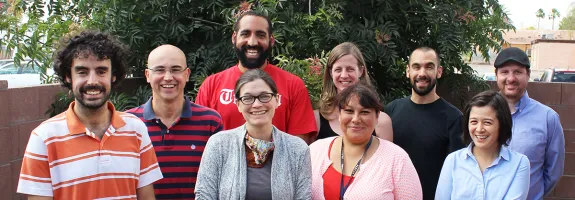
From left to right, bottom row: Martin Barros, Angela Storey, Anabel Galindo, Carolina Maki Kitagawa; Top row: Joaquin Perez-Blanes, William White, Christina Greene, Gabriel Higuera, Jeffrey Wilson; Not pictured: Christopher Yutzy
With our Graduate Fellowships, we provide real world research experience by funding projects that are diverse, innovative and demonstrate a broad commitment to interdisciplinary explorations. For 2015-2016, Confluencenter's nine graduate fellows - hailing from the colleges of Fine Arts, Humanities, Social and Behavioral Sciences - received close to $45,000. We are advancing the next generation of thinkers and researchers and are honored to do so.
Mapping Yaqui History: Mobility, Labor, and Identity
History PhD student Anabel Galindo mapped the historical movement patterns and settlements that Yaquis have followed since the last decades of the Spanish rule and into the mid-twentieth century. By searching for factors that influenced collective movement and helped Yaquis retain symbolism of cultural resilience, this project postulated that Yaquis exercised agency and negotiation within and outside of both colonial and republican institutions.
Drought, Livelihoods, and the Food System: Exploring Drought Narratives in California
Christina Greene, PhD student in Geography and Development, explored the physical and social dimensions of drought through the words and images of people living and working in drought-impacted central California. Along with analyzing narratives that link agricultural livelihoods and the food system, this project used web-based storytelling to share new perspectives that challenge dominant notions of drought impacts and drought relief.
In December 2016, Greene was awarded a $95,000 pre-doctoral fellowship from the U.S. Department of Agriculture's National Institute of Food and Agriculture.
Collaborative Research in Action
Gabriel Higuera, PhD student in Mexican American Studies, organized an interdisciplinary, multi-institutional event where high school students shared their research on Ethnic Studies in a format similar to conferences held on college campuses. This symposium connected high school and college students as they engaged in dialogues about ethnic studies, enhanced platforms for youth voices as they share ideas with the public and helped local organizations collaborate with Tucson youth. Collaborative Research in Action (CRiA) is an inter-generational, multi-institutional project designed to examine the lived experiences of our communities, share findings, propose and enact alternatives to today's critical issues.
Como 8 Horas
MFA student Carolina Kitagawa composed a time-based performance art piece that examined underrepresented voices in Tucson and Los Angeles. As a live event that fostered collaborations among artists in Tucson and Los Angeles, the multi-media performance transmitted video footage between the two cities and combined sculpture and imagery to explore how the Kitagawa/Frisby family navigated locations, borders and histories between these two cities and the U.S.-Mexico border.
Amuletos Through the Frontera
Manuel Martín Barros and Joaquin Perez-Blanes, PhD students in Spanish and Portuguese, visually and textually narrated the experiences of migrants crossing the U.S.-Mexico border and the role amulets played in their journeys. While the migrants' identities remained anonymous, an examination of objects they carried for good luck was exhibited to build better understandings of how migrants maintained hope in their crossings.
Everyday Infrastructure: Documenting Struggles for Water, Sanitation, and Electricity in Cape Town's Informal Settlements
Anthropology PhD student Angela Storey traced how residents of informal settlements narrate their struggles to secure access to basic services. Highlighting the often overlooked and unknown everyday experiences of residents, this project explored individual efforts to secure water, electricity and sanitation, as well as community perceptions of the reasons for the gaps in service. Through combining photographs and audio recorded interviews, this project improved understandings of lived inequality and how local residents challenge the structures that created this inequality.
Archaeology at the Confluence of Race: The River Street Public Archaeology Program
William White, PhD student in Anthropology, explored the remains of a working-class, interracial neighborhood in Boise, Idaho, collected information about the neighborhood and shared findings with the descendant community and the general public. In its efforts to investigate how racialization affected whiteness as a racial construct in Boise, the public outreach component of this project allowed it to teach university students and the community about how working-class Boiseans lived in a multi-ethnic neighborhood.
Geography and the Graphic Novel
Geography and Development PhD student Jeffrey Wilson created a graphic novel that explores the experiences of Detroit residents battling Type 2 diabetes and housing insecurity. In an effort to bring a knowledge of geographic research to the wider public, this project shared information about the Detroit housing crisis and its effects on how residents manage a pervasive medical condition.
Improving Information Access in Urban Slums: Social Technology as a Practical Alternative to Clientelism
Christopher Yutzy, PhD student in Anthropology, created a communications nexus -- comprised of a magazine called A Voz de Todos, a website for digital content, social media and WhatsApp groups -- through which neighborhood residents of the Grande Bom Jardim slum in Fortaleza, Brazil, shared information and established avenues for free speech. This project investigated how Grande Bom Jardin residents used these technologies to counter clientelism, the practice of depending on personal relationships in politics rather than democratic processes.

